Entrepreneurship Module Case Study: Steve Jobs' Traits and Success
VerifiedAdded on 2022/11/10
|7
|1518
|54
Case Study
AI Summary
This case study delves into the entrepreneurial journey of Steve Jobs, examining his personality traits such as perfectionism, learning from failures, and innovation. It analyzes these traits in the context of his success with Apple, while also acknowledging the limitations of solely relying on trait theory to understand entrepreneurial behavior. The study explores other crucial factors for entrepreneurial success, including the ecosystem and the people involved. The analysis concludes that while traits are important, a holistic view considering environmental and social factors is essential to understanding entrepreneurial success. The case study uses the work of Burns (2016) and other academic literature to support the analysis, providing a balanced perspective on the factors that contributed to Steve Jobs's achievements and impact on the business world.
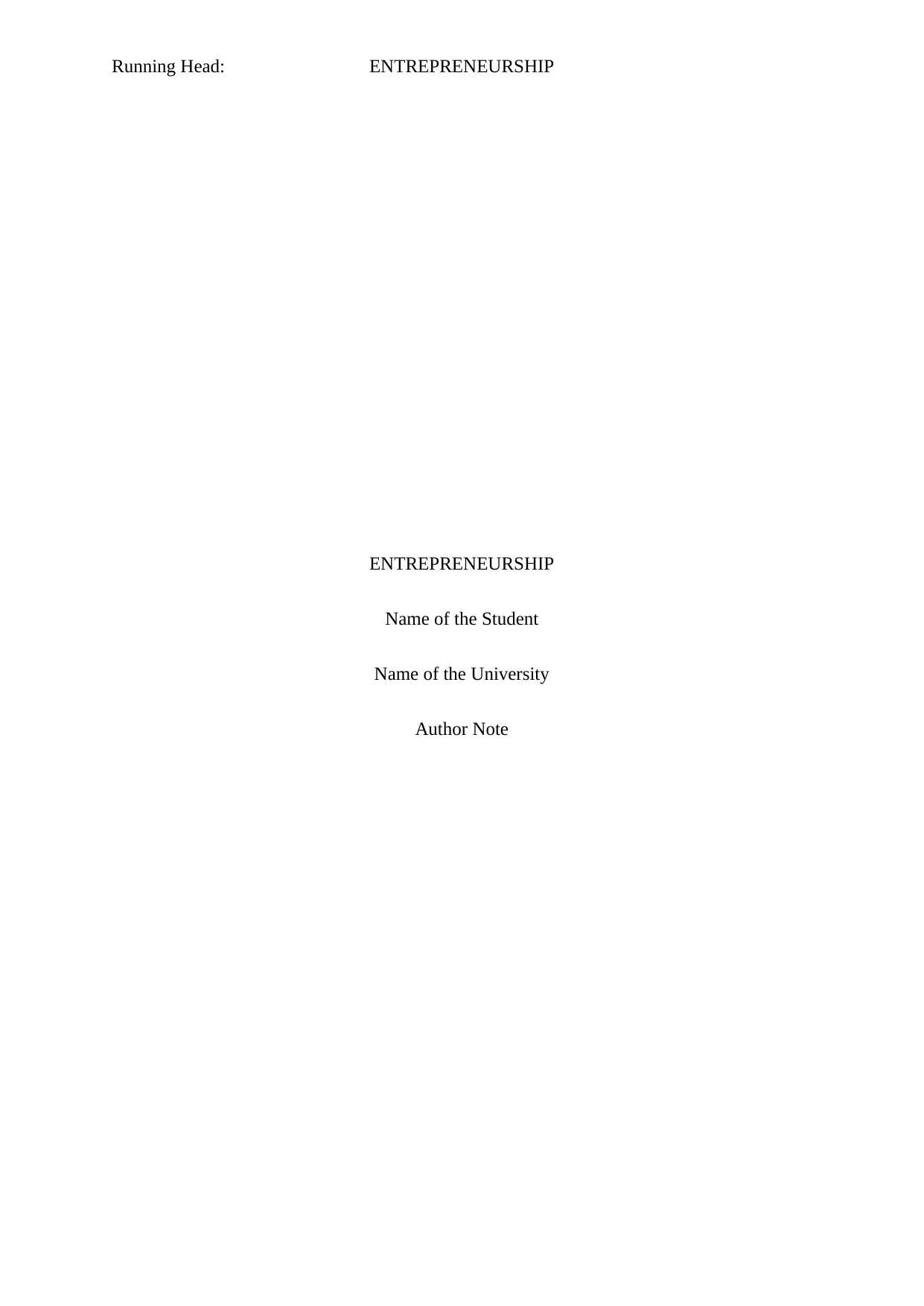
Running Head: ENTREPRENEURSHIP
ENTREPRENEURSHIP
Name of the Student
Name of the University
Author Note
ENTREPRENEURSHIP
Name of the Student
Name of the University
Author Note
Paraphrase This Document
Need a fresh take? Get an instant paraphrase of this document with our AI Paraphraser
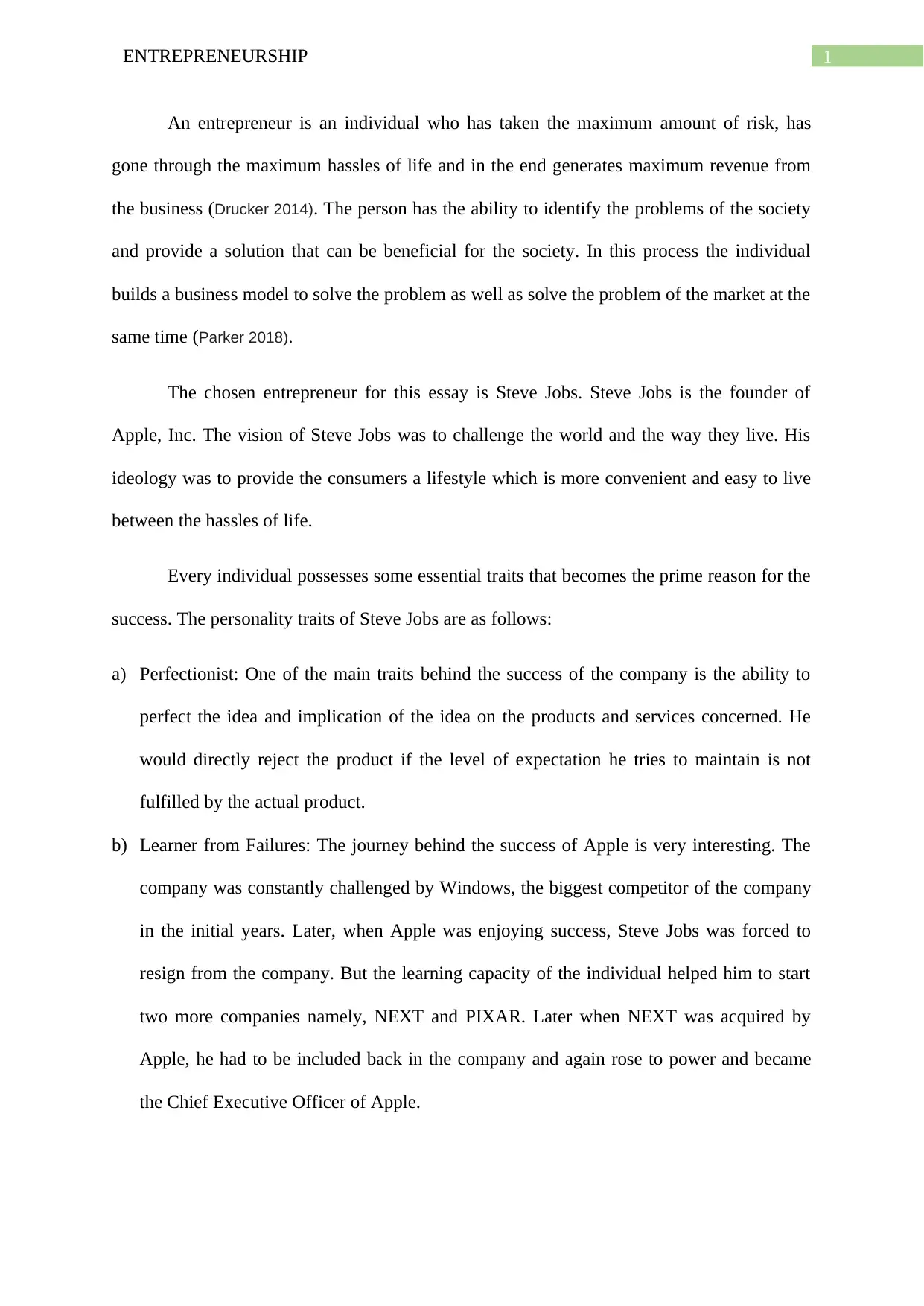
1ENTREPRENEURSHIP
An entrepreneur is an individual who has taken the maximum amount of risk, has
gone through the maximum hassles of life and in the end generates maximum revenue from
the business (Drucker 2014). The person has the ability to identify the problems of the society
and provide a solution that can be beneficial for the society. In this process the individual
builds a business model to solve the problem as well as solve the problem of the market at the
same time (Parker 2018).
The chosen entrepreneur for this essay is Steve Jobs. Steve Jobs is the founder of
Apple, Inc. The vision of Steve Jobs was to challenge the world and the way they live. His
ideology was to provide the consumers a lifestyle which is more convenient and easy to live
between the hassles of life.
Every individual possesses some essential traits that becomes the prime reason for the
success. The personality traits of Steve Jobs are as follows:
a) Perfectionist: One of the main traits behind the success of the company is the ability to
perfect the idea and implication of the idea on the products and services concerned. He
would directly reject the product if the level of expectation he tries to maintain is not
fulfilled by the actual product.
b) Learner from Failures: The journey behind the success of Apple is very interesting. The
company was constantly challenged by Windows, the biggest competitor of the company
in the initial years. Later, when Apple was enjoying success, Steve Jobs was forced to
resign from the company. But the learning capacity of the individual helped him to start
two more companies namely, NEXT and PIXAR. Later when NEXT was acquired by
Apple, he had to be included back in the company and again rose to power and became
the Chief Executive Officer of Apple.
An entrepreneur is an individual who has taken the maximum amount of risk, has
gone through the maximum hassles of life and in the end generates maximum revenue from
the business (Drucker 2014). The person has the ability to identify the problems of the society
and provide a solution that can be beneficial for the society. In this process the individual
builds a business model to solve the problem as well as solve the problem of the market at the
same time (Parker 2018).
The chosen entrepreneur for this essay is Steve Jobs. Steve Jobs is the founder of
Apple, Inc. The vision of Steve Jobs was to challenge the world and the way they live. His
ideology was to provide the consumers a lifestyle which is more convenient and easy to live
between the hassles of life.
Every individual possesses some essential traits that becomes the prime reason for the
success. The personality traits of Steve Jobs are as follows:
a) Perfectionist: One of the main traits behind the success of the company is the ability to
perfect the idea and implication of the idea on the products and services concerned. He
would directly reject the product if the level of expectation he tries to maintain is not
fulfilled by the actual product.
b) Learner from Failures: The journey behind the success of Apple is very interesting. The
company was constantly challenged by Windows, the biggest competitor of the company
in the initial years. Later, when Apple was enjoying success, Steve Jobs was forced to
resign from the company. But the learning capacity of the individual helped him to start
two more companies namely, NEXT and PIXAR. Later when NEXT was acquired by
Apple, he had to be included back in the company and again rose to power and became
the Chief Executive Officer of Apple.
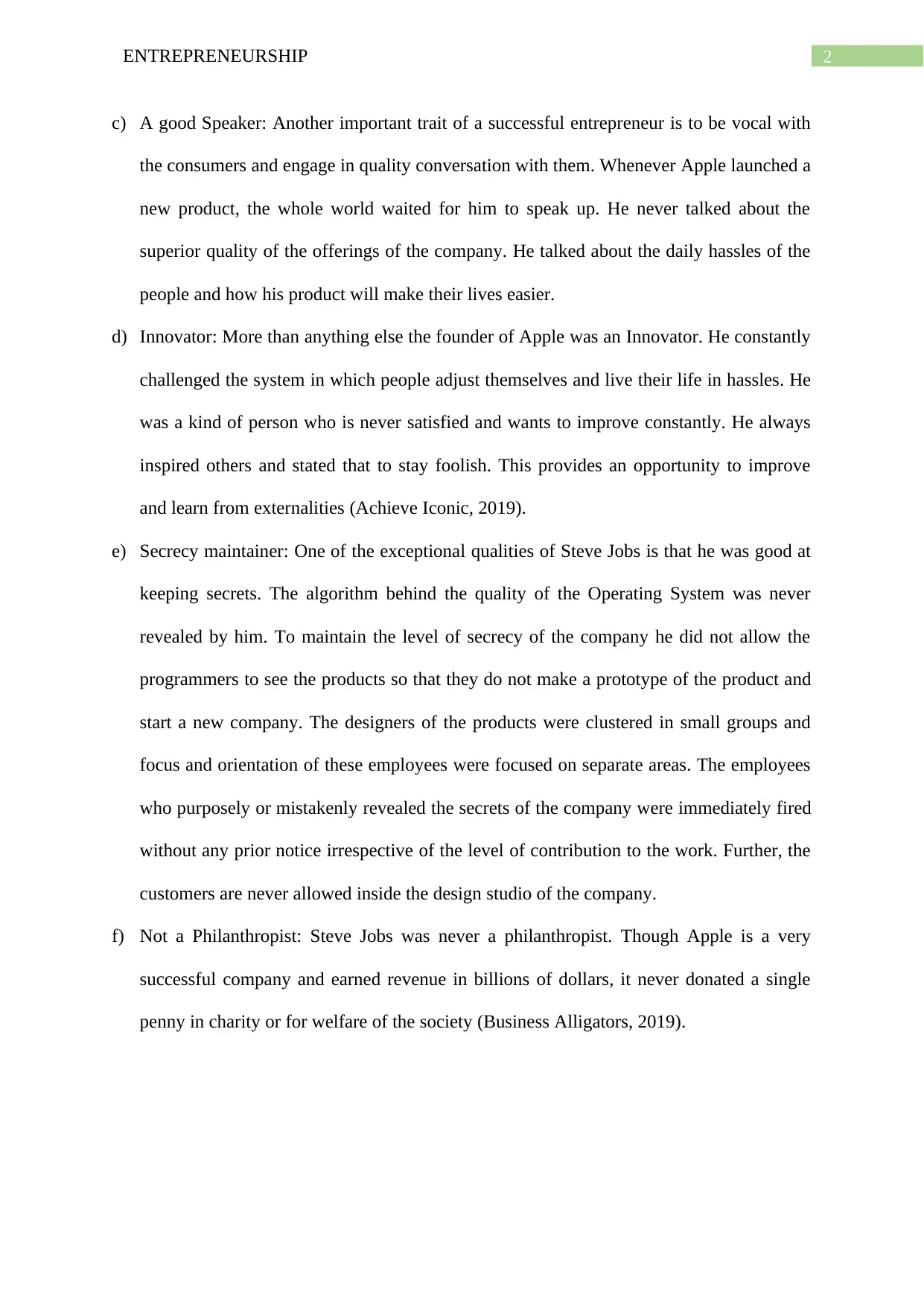
2ENTREPRENEURSHIP
c) A good Speaker: Another important trait of a successful entrepreneur is to be vocal with
the consumers and engage in quality conversation with them. Whenever Apple launched a
new product, the whole world waited for him to speak up. He never talked about the
superior quality of the offerings of the company. He talked about the daily hassles of the
people and how his product will make their lives easier.
d) Innovator: More than anything else the founder of Apple was an Innovator. He constantly
challenged the system in which people adjust themselves and live their life in hassles. He
was a kind of person who is never satisfied and wants to improve constantly. He always
inspired others and stated that to stay foolish. This provides an opportunity to improve
and learn from externalities (Achieve Iconic, 2019).
e) Secrecy maintainer: One of the exceptional qualities of Steve Jobs is that he was good at
keeping secrets. The algorithm behind the quality of the Operating System was never
revealed by him. To maintain the level of secrecy of the company he did not allow the
programmers to see the products so that they do not make a prototype of the product and
start a new company. The designers of the products were clustered in small groups and
focus and orientation of these employees were focused on separate areas. The employees
who purposely or mistakenly revealed the secrets of the company were immediately fired
without any prior notice irrespective of the level of contribution to the work. Further, the
customers are never allowed inside the design studio of the company.
f) Not a Philanthropist: Steve Jobs was never a philanthropist. Though Apple is a very
successful company and earned revenue in billions of dollars, it never donated a single
penny in charity or for welfare of the society (Business Alligators, 2019).
c) A good Speaker: Another important trait of a successful entrepreneur is to be vocal with
the consumers and engage in quality conversation with them. Whenever Apple launched a
new product, the whole world waited for him to speak up. He never talked about the
superior quality of the offerings of the company. He talked about the daily hassles of the
people and how his product will make their lives easier.
d) Innovator: More than anything else the founder of Apple was an Innovator. He constantly
challenged the system in which people adjust themselves and live their life in hassles. He
was a kind of person who is never satisfied and wants to improve constantly. He always
inspired others and stated that to stay foolish. This provides an opportunity to improve
and learn from externalities (Achieve Iconic, 2019).
e) Secrecy maintainer: One of the exceptional qualities of Steve Jobs is that he was good at
keeping secrets. The algorithm behind the quality of the Operating System was never
revealed by him. To maintain the level of secrecy of the company he did not allow the
programmers to see the products so that they do not make a prototype of the product and
start a new company. The designers of the products were clustered in small groups and
focus and orientation of these employees were focused on separate areas. The employees
who purposely or mistakenly revealed the secrets of the company were immediately fired
without any prior notice irrespective of the level of contribution to the work. Further, the
customers are never allowed inside the design studio of the company.
f) Not a Philanthropist: Steve Jobs was never a philanthropist. Though Apple is a very
successful company and earned revenue in billions of dollars, it never donated a single
penny in charity or for welfare of the society (Business Alligators, 2019).
⊘ This is a preview!⊘
Do you want full access?
Subscribe today to unlock all pages.

Trusted by 1+ million students worldwide
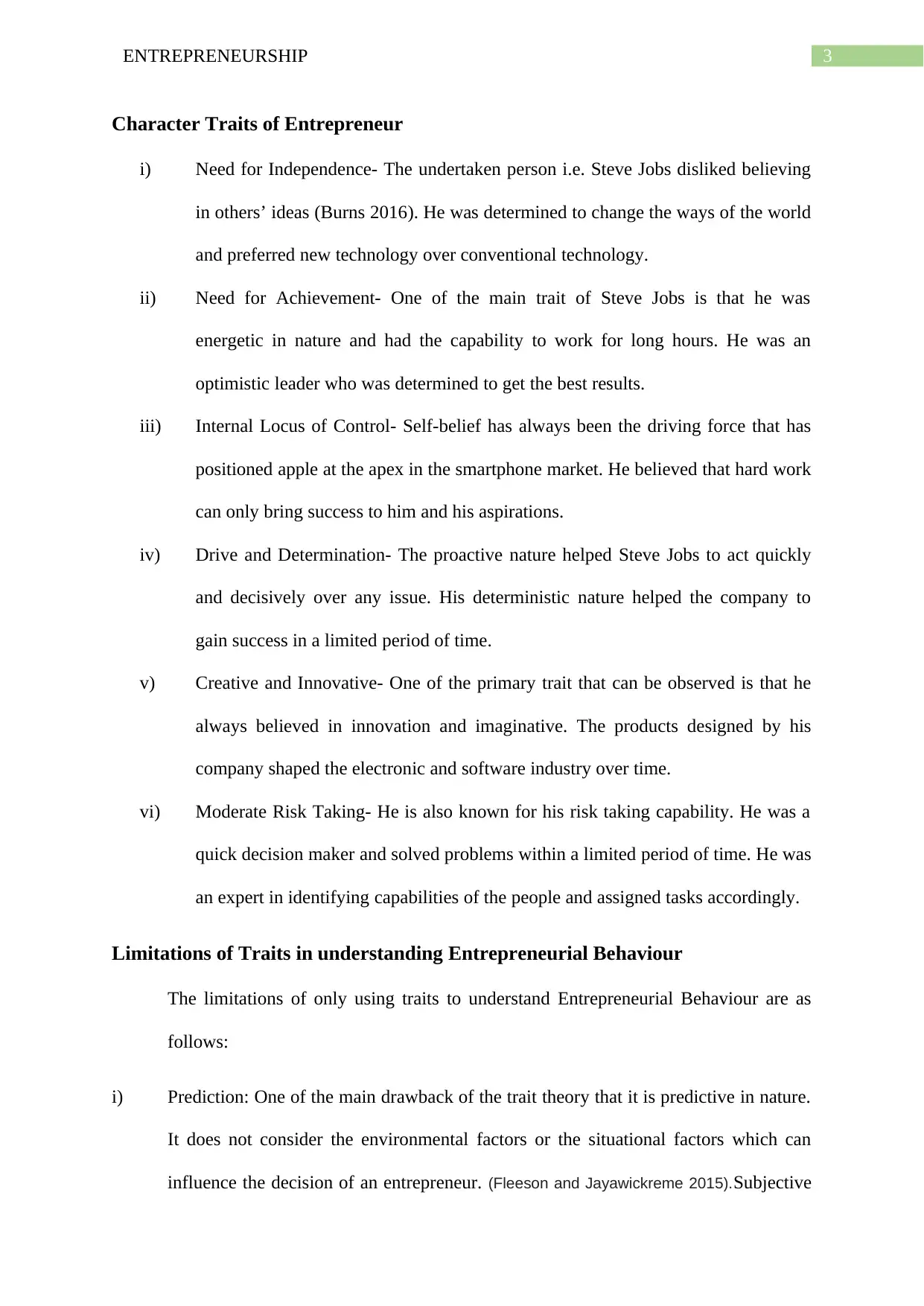
3ENTREPRENEURSHIP
Character Traits of Entrepreneur
i) Need for Independence- The undertaken person i.e. Steve Jobs disliked believing
in others’ ideas (Burns 2016). He was determined to change the ways of the world
and preferred new technology over conventional technology.
ii) Need for Achievement- One of the main trait of Steve Jobs is that he was
energetic in nature and had the capability to work for long hours. He was an
optimistic leader who was determined to get the best results.
iii) Internal Locus of Control- Self-belief has always been the driving force that has
positioned apple at the apex in the smartphone market. He believed that hard work
can only bring success to him and his aspirations.
iv) Drive and Determination- The proactive nature helped Steve Jobs to act quickly
and decisively over any issue. His deterministic nature helped the company to
gain success in a limited period of time.
v) Creative and Innovative- One of the primary trait that can be observed is that he
always believed in innovation and imaginative. The products designed by his
company shaped the electronic and software industry over time.
vi) Moderate Risk Taking- He is also known for his risk taking capability. He was a
quick decision maker and solved problems within a limited period of time. He was
an expert in identifying capabilities of the people and assigned tasks accordingly.
Limitations of Traits in understanding Entrepreneurial Behaviour
The limitations of only using traits to understand Entrepreneurial Behaviour are as
follows:
i) Prediction: One of the main drawback of the trait theory that it is predictive in nature.
It does not consider the environmental factors or the situational factors which can
influence the decision of an entrepreneur. (Fleeson and Jayawickreme 2015).Subjective
Character Traits of Entrepreneur
i) Need for Independence- The undertaken person i.e. Steve Jobs disliked believing
in others’ ideas (Burns 2016). He was determined to change the ways of the world
and preferred new technology over conventional technology.
ii) Need for Achievement- One of the main trait of Steve Jobs is that he was
energetic in nature and had the capability to work for long hours. He was an
optimistic leader who was determined to get the best results.
iii) Internal Locus of Control- Self-belief has always been the driving force that has
positioned apple at the apex in the smartphone market. He believed that hard work
can only bring success to him and his aspirations.
iv) Drive and Determination- The proactive nature helped Steve Jobs to act quickly
and decisively over any issue. His deterministic nature helped the company to
gain success in a limited period of time.
v) Creative and Innovative- One of the primary trait that can be observed is that he
always believed in innovation and imaginative. The products designed by his
company shaped the electronic and software industry over time.
vi) Moderate Risk Taking- He is also known for his risk taking capability. He was a
quick decision maker and solved problems within a limited period of time. He was
an expert in identifying capabilities of the people and assigned tasks accordingly.
Limitations of Traits in understanding Entrepreneurial Behaviour
The limitations of only using traits to understand Entrepreneurial Behaviour are as
follows:
i) Prediction: One of the main drawback of the trait theory that it is predictive in nature.
It does not consider the environmental factors or the situational factors which can
influence the decision of an entrepreneur. (Fleeson and Jayawickreme 2015).Subjective
Paraphrase This Document
Need a fresh take? Get an instant paraphrase of this document with our AI Paraphraser
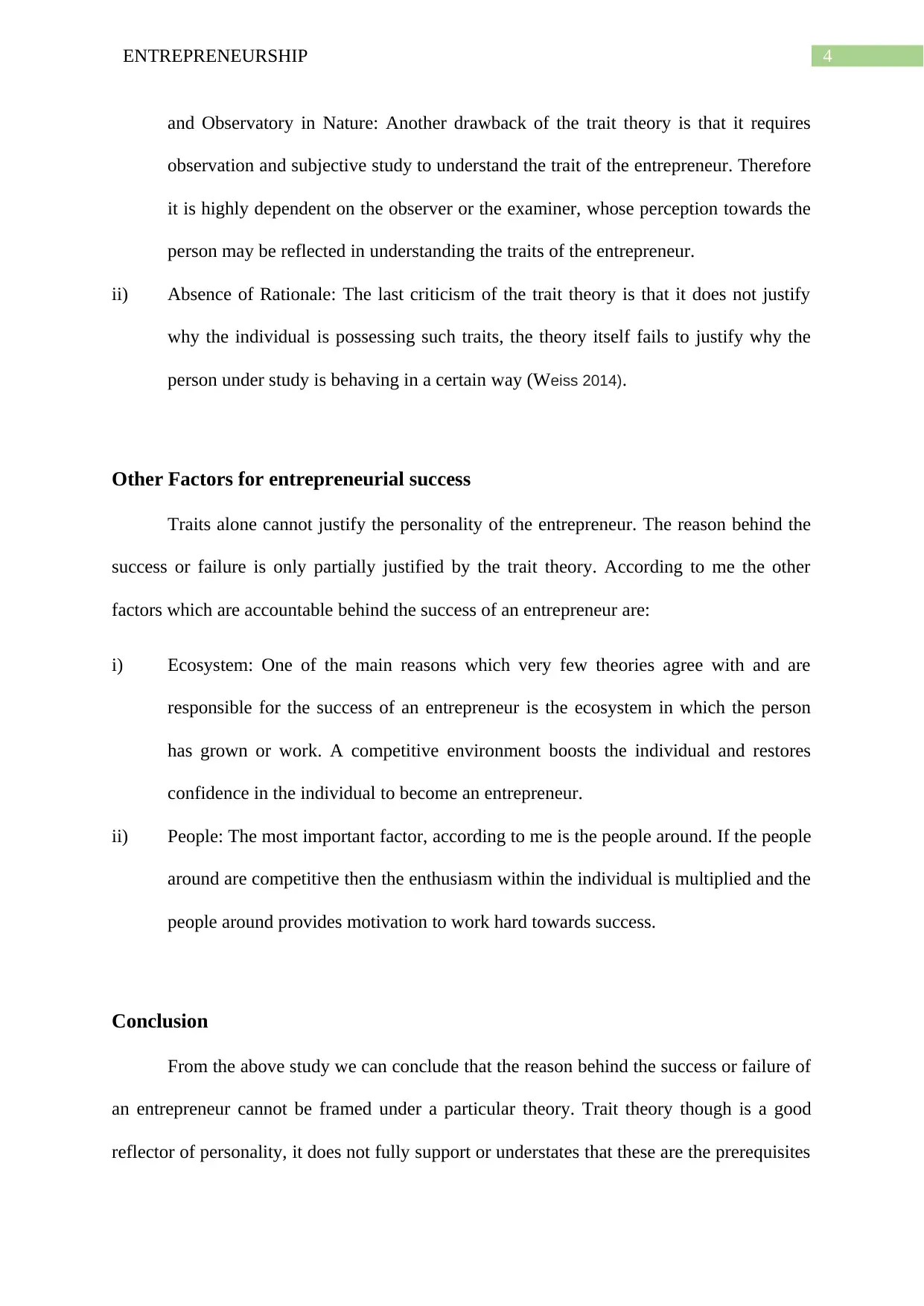
4ENTREPRENEURSHIP
and Observatory in Nature: Another drawback of the trait theory is that it requires
observation and subjective study to understand the trait of the entrepreneur. Therefore
it is highly dependent on the observer or the examiner, whose perception towards the
person may be reflected in understanding the traits of the entrepreneur.
ii) Absence of Rationale: The last criticism of the trait theory is that it does not justify
why the individual is possessing such traits, the theory itself fails to justify why the
person under study is behaving in a certain way (Weiss 2014).
Other Factors for entrepreneurial success
Traits alone cannot justify the personality of the entrepreneur. The reason behind the
success or failure is only partially justified by the trait theory. According to me the other
factors which are accountable behind the success of an entrepreneur are:
i) Ecosystem: One of the main reasons which very few theories agree with and are
responsible for the success of an entrepreneur is the ecosystem in which the person
has grown or work. A competitive environment boosts the individual and restores
confidence in the individual to become an entrepreneur.
ii) People: The most important factor, according to me is the people around. If the people
around are competitive then the enthusiasm within the individual is multiplied and the
people around provides motivation to work hard towards success.
Conclusion
From the above study we can conclude that the reason behind the success or failure of
an entrepreneur cannot be framed under a particular theory. Trait theory though is a good
reflector of personality, it does not fully support or understates that these are the prerequisites
and Observatory in Nature: Another drawback of the trait theory is that it requires
observation and subjective study to understand the trait of the entrepreneur. Therefore
it is highly dependent on the observer or the examiner, whose perception towards the
person may be reflected in understanding the traits of the entrepreneur.
ii) Absence of Rationale: The last criticism of the trait theory is that it does not justify
why the individual is possessing such traits, the theory itself fails to justify why the
person under study is behaving in a certain way (Weiss 2014).
Other Factors for entrepreneurial success
Traits alone cannot justify the personality of the entrepreneur. The reason behind the
success or failure is only partially justified by the trait theory. According to me the other
factors which are accountable behind the success of an entrepreneur are:
i) Ecosystem: One of the main reasons which very few theories agree with and are
responsible for the success of an entrepreneur is the ecosystem in which the person
has grown or work. A competitive environment boosts the individual and restores
confidence in the individual to become an entrepreneur.
ii) People: The most important factor, according to me is the people around. If the people
around are competitive then the enthusiasm within the individual is multiplied and the
people around provides motivation to work hard towards success.
Conclusion
From the above study we can conclude that the reason behind the success or failure of
an entrepreneur cannot be framed under a particular theory. Trait theory though is a good
reflector of personality, it does not fully support or understates that these are the prerequisites

5ENTREPRENEURSHIP
for becoming a successful entrepreneur. The rationale behind choosing Steve Jobs as the
entrepreneur for the study is that he has changed the way people think and challenged the
standards of living of the people. Apple made the world realise that even a small smartphone
can be converted into an aspirational product. Lastly, the ecosystem and the people involved
are equally responsible for the success and failure of an entrepreneur.
for becoming a successful entrepreneur. The rationale behind choosing Steve Jobs as the
entrepreneur for the study is that he has changed the way people think and challenged the
standards of living of the people. Apple made the world realise that even a small smartphone
can be converted into an aspirational product. Lastly, the ecosystem and the people involved
are equally responsible for the success and failure of an entrepreneur.
⊘ This is a preview!⊘
Do you want full access?
Subscribe today to unlock all pages.

Trusted by 1+ million students worldwide
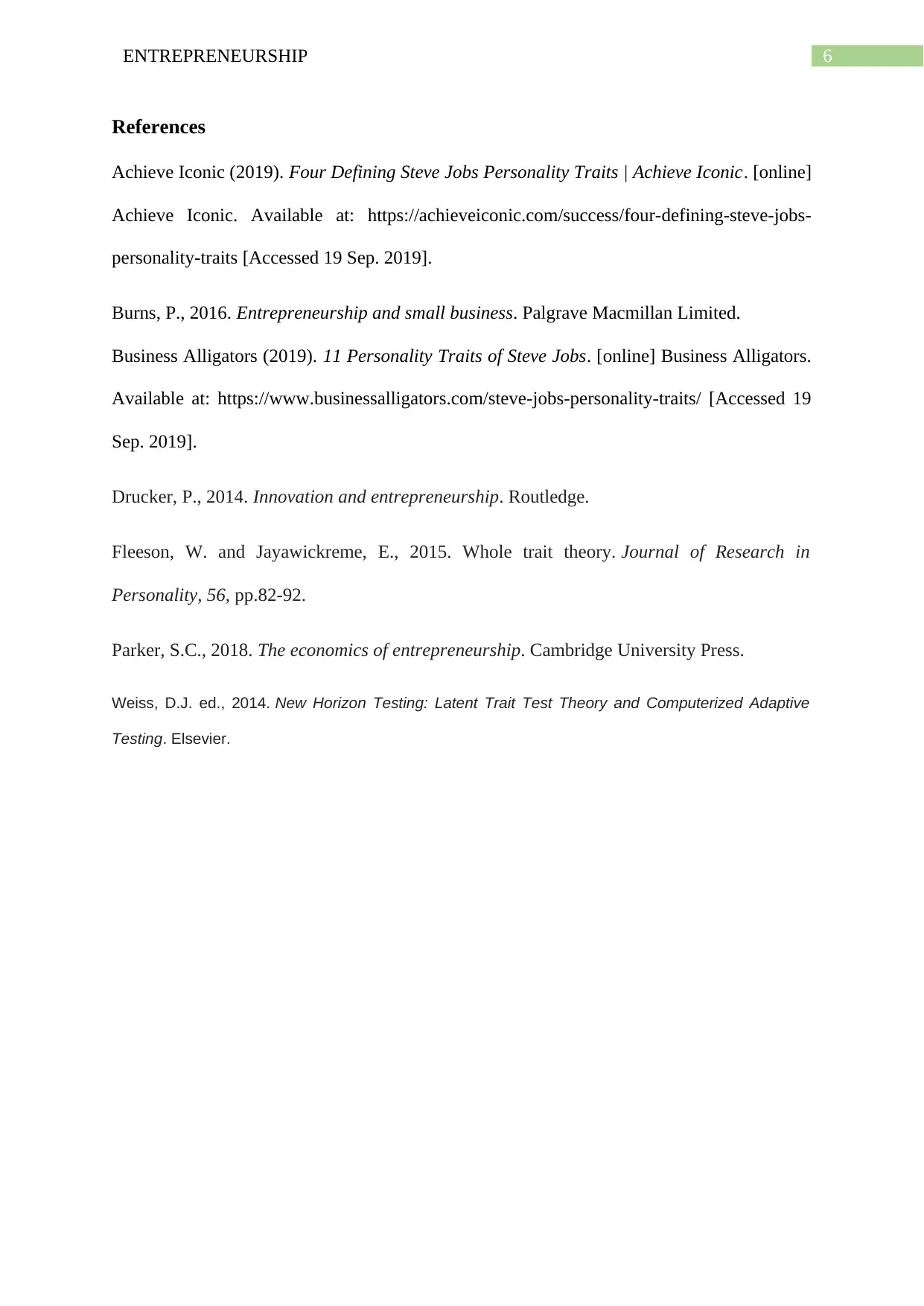
6ENTREPRENEURSHIP
References
Achieve Iconic (2019). Four Defining Steve Jobs Personality Traits | Achieve Iconic. [online]
Achieve Iconic. Available at: https://achieveiconic.com/success/four-defining-steve-jobs-
personality-traits [Accessed 19 Sep. 2019].
Burns, P., 2016. Entrepreneurship and small business. Palgrave Macmillan Limited.
Business Alligators (2019). 11 Personality Traits of Steve Jobs. [online] Business Alligators.
Available at: https://www.businessalligators.com/steve-jobs-personality-traits/ [Accessed 19
Sep. 2019].
Drucker, P., 2014. Innovation and entrepreneurship. Routledge.
Fleeson, W. and Jayawickreme, E., 2015. Whole trait theory. Journal of Research in
Personality, 56, pp.82-92.
Parker, S.C., 2018. The economics of entrepreneurship. Cambridge University Press.
Weiss, D.J. ed., 2014. New Horizon Testing: Latent Trait Test Theory and Computerized Adaptive
Testing. Elsevier.
References
Achieve Iconic (2019). Four Defining Steve Jobs Personality Traits | Achieve Iconic. [online]
Achieve Iconic. Available at: https://achieveiconic.com/success/four-defining-steve-jobs-
personality-traits [Accessed 19 Sep. 2019].
Burns, P., 2016. Entrepreneurship and small business. Palgrave Macmillan Limited.
Business Alligators (2019). 11 Personality Traits of Steve Jobs. [online] Business Alligators.
Available at: https://www.businessalligators.com/steve-jobs-personality-traits/ [Accessed 19
Sep. 2019].
Drucker, P., 2014. Innovation and entrepreneurship. Routledge.
Fleeson, W. and Jayawickreme, E., 2015. Whole trait theory. Journal of Research in
Personality, 56, pp.82-92.
Parker, S.C., 2018. The economics of entrepreneurship. Cambridge University Press.
Weiss, D.J. ed., 2014. New Horizon Testing: Latent Trait Test Theory and Computerized Adaptive
Testing. Elsevier.
1 out of 7
Related Documents
Your All-in-One AI-Powered Toolkit for Academic Success.
+13062052269
info@desklib.com
Available 24*7 on WhatsApp / Email
![[object Object]](/_next/static/media/star-bottom.7253800d.svg)
Unlock your academic potential
Copyright © 2020–2025 A2Z Services. All Rights Reserved. Developed and managed by ZUCOL.





